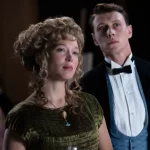Scott’s Top Ten of 2021

I doubt I have to reiterate the obvious stuff about the unusual times we were in and how movies continue to be a respite from madness, but nevertheless, I missed the cinema something fierce for the 15 or so months without it, so every trip was a miniature moment of salvation. I saw six of my ten favorites theatrically (three of them more than once), thrilled with audiences either echoing my own sensation or almost violently countering it. While obviously home viewing did not limit the rapture some movies could provide, “the movies” as an art form is an inherently public one for me; and, I would argue, for the form itself – tell me how many movies made a dent of an impression with the public without some kind of theatrical release, and then we can have an honest conversation about the state of things. While it remains under siege by innumerable forces, and hopefully long after the battle is ultimately won for movie houses, I will stubbornly celebrate whatever I can draw from it.
And much there was to draw. Several great films were slated for release in 2020, but held out to be given a real platform on which to succeed. And succeed, to me, they did. Picking ten is fruitless any year, but I whittled it down to those which plain and simple most captivated me, most left me floored and speechless and in love once again, and lodged themselves stubbornly into my mind, body, and soul.
But this being a written list, I can also throw out a further fifteen titles that came damn close, and you can acknowledge them or skim past them as you like – Zola, Licorice Pizza, The Woman Who Ran, The World to Come, Isabella, France, Just Don’t Think I’ll Scream, Passing, Dune, Memoria, Suzanna Andler, The Scary of Sixty-First, Bad Luck Banging or Loony Porn, Titane, and The Matrix Resurrections.

10. Summer of 85 (dir. François Ozon)
Set on the cool summer shores of Normandy in the year the title suggests – the same period in which the director read the novel upon which his film is based – Ozon’s 19th feature in his ferociously-paced and varied career is one of his most personal, intimate, and sweetest works. Two boys who meet virtually by accident throw themselves into a summer fling at a time when homosexuality was still an inherently subversive act. Ozon, no stranger to portraying sex and love as dirty thrills, neither shies away from the context of the time nor lets them damn themselves for it; young love has a way of damning itself either way.

9. The Lost Daughter (dir. Maggie Gyllenhaal)
Speaking of idyllic settings and chaotic emotions, Gyllenhaal’s feature debut throws a college professor and translator (Olivia Colman) into a working vacation in Greece. She hopes to shut the world away, but it keeps coming for her, most prominently in the form of a vacationing family whose multitude of maternal concerns bring back painful memories of her own child-rearing days, which she recalls with a mixture of regret and satisfaction. Gyllenhaal is not at all sentimental about motherhood, tackling most decisively the way women have too long been tasked with putting their lives on hold precisely when they should be coming into themselves; Colman’s contemporary hardened exterior is contrasted beautifully with Jessie Buckley playing the same character in flashbacks, tormented by the expectations before her and building up the walls Colman comes to live in. Gyllenhaal’s first-person camera forms a mindset that is at once precise and singular and largely uncategorizable.

8. The Card Counter (dir. Paul Schrader)
In Schrader’s latest masterpiece, casinos are prisons disguised as paradises, an escape from one’s ordinary life far more regimented and controlled than any ordinary habitat. For his protagonist, William Tell (Oscar Isaac, coming into his own as a star), it is home. He spends as many days and nights as he can gambling to keep his mind occupied, away from his past, away from the lives he destroyed and the regret he’s faced. A second chance comes in the form of another aimless young man (Tye Sheridan) who’s set upon a mission that dredges up William’s past. But redemption is tough to find in Schrader’s world, and never comes without plunging oneself further into the darkness, where even the neon lights can’t find you.

7. Wheel of Fortune and Fantasy (dir. Ryusuke Hamaguchi)
Three stories connected by false impressions, misunderstandings, and reversals that bring secrets to bear, it would be unfair to reveal much about any of them. Two women see different things in one man; the too-powerful effect of great fiction on busy lives; and a reunion by any other name – let’s leave it at that. What do we mean to other people, and how does our meaning to them affect how we behave, and even what we mean to ourselves? Where is the edge between a lie and a welcome mask? Hamaguchi’s sense of patience and confidence in his ability to catch us off guard, remain some of his finest qualities; pulling the rug out through direct address and sudden zooms to bring these questions very suddenly to the fore, to emphasize particular moments amidst otherwise-naturalistic scenes, drawing out of them a particular unnatural aesthetic texture and unsettling our presumptions, just as his characters are becoming unsettled.

6. Last Night in Soho (dir. Edgar Wright)
Wright emerges from his biggest financial success refreshingly willing to dispense with his wit, using instead his aesthetic and structural rigor to continually disarm his mentally-frought protagonist, new-to-London fashion student – and possible medium – Ellie (Thomasin McKenzie). It’s one thing to communicate with the dead when in rural England; only mom has died out there. London is filled with temporary graves, and one girl in particular (Anya Taylor-Joy) keeps emerging. At first it’s a thrill to visit her world, London the mid-to-late 1960s, until the underbelly of the town emerges and takes hold of them both. What else to do but to bury herself with her? Can’t change the past after all. Wright’s abandonment of wit need not leave us without his consummate talent for composition and choreography, folding instead the perfection of his technique into a psychic and emotional prison, each step accounted for in his design, each avenue of escape a mirrored wall reflecting things best left buried.

5. Petite Maman (dir. Celine Sciamma)
The inescapable past, and complete authorial control of the frame, are welcome traits as well in Sciamma’s best film to date, a slight and wise children’s film without a wasted moment or a rushed scene. Filled with tangible details – the colors of walls, an adventurous fort, the sounds of grandma’s house – yet seeming to exist in an otherworldly plane, it’s a film stocked with contradictions that are presented so plainly and naturally as to never be called into question. Whereas Wright’s command of the screen builds terror, Sciamma builds a home; two, even.

4. Shiva Baby (dir. Emma Seligman)
A quietly confident debut film, Seligman uses all her limitations – a single location, a fixed cast – to fuel her protagonist’s anxiety. Danielle (Rachel Sennott) is a college senior nearing graduation with no future, whose present is bearing down on her at a shiva observance. There’s her estranged high school girlfriend (Molly Gordon), there are her parents (Polly Draper and Fred Melamed) hounding her to get a career going, there are dozens of relatives and family friends with all kinds of questions and praise disguising their suspicion and criticism. Oh, and there’s her sugar daddy…and his wife…and their infant daughter. For Danielle, a nightmare; for Seligman and her audience, pure comedy, and the funniest film of the year.

3. The Worst Person in the World (dir. Joachim Trier)
The pressures on young people of today also come front and center in Trier’s near-comedy, near-melodrama, a film of a dozen chapters chronicling postgrad life. Julie (Renate Reinsve) churned through a handful of majors in college, starting with surgeon and plummeting to on-again/off-again writer, ending her collegiate career as a part-time salesperson at a chain bookstore. Fortunately, she’s caught the eye of Aksel (Anders Danielsen Lie), a successful middle-aged cartoonist who doesn’t need her to be anything but herself. Well, maybe if she wanted children that would help. But Julie doesn’t know what she wants. It could be the odd tall man (Herbert Nordrum) she meets at a wedding she crashes. That feels like romance. Trier’s film is as interested in fantasy as it is the concrete things that drive our romantic lives, full sections dedicated to fantasias where others couldn’t be more ordinary. It’s the rare film that seems to capture the present all at once, like it dropped its needle on the record rotating all around us and picked up the frequency we’re emanating. But of course, those are outdated terms, and that world has left us completely behind. There aren’t any times but new times.

2. Bergman Island (dir. Mia Hansen-Løve)
After a decade spent making films about the passage of time, Hansen-Løve’s best film to date is her most concentrated and imaginative. A couple, Chris (Vicky Krieps) and Tony (Tim Roth), retreat to Fårö, a Swedish island where legendary director Ingmar Bergman lived out the second half of his life and made many of his most famous films. The island has since become something of a tourist attraction and veritable theme park; what better tribute to one of his country’s greatest artists? Far from assuming the qualities of Bergman for herself, Hansen-Løve’s portrait of adult romantic relationships is occasionally fraught but often sweet, the island an idyllic getaway rather than the land of banishment Bergman used it to convey. This being an artistic couple, they’re here to create, and create Chris does, right before our very eyes, in a section of imagination that brilliantly, emotionally, and thrillingly reflects on what she was already thinking about, from a new perspective, and an old place that seems new.

1. West Side Story (dir. Steven Spielberg)
The musical is one of a handful of mainstream genres in which cinema can reach its full potential, the collision of a great many disciplines into something completely unique that has enthralled audiences for decades. Nevertheless, the form has become too ill-considered in the past twenty years, often unable to grow with the times, and not pursued by serious filmmakers with genuine talent for the ways the camera and performer can dance together in harmony, who can seize the way blatantly artificial light can cause sensations naturalism can only dream of. Steven Spielberg is no stranger to harmonizing his performers and camera, his cinematographer Janusz Kaminski no stranger to flooding us with spellbinding light, here finding their natural, ultimate outlet, a restaged and reworked version of one of the greatest musicals ever concocted. His version sees the neighborhood tearing itself down well before the Jets and the Sharks ever could, yet the background of impending industrial slaughter doesn’t deter them one bit from the only problems they can feel at the end of their fists. The world is coming down around us, as well, yet we fight meaningless battles and fall in love and dance in the streets, and this sideways reflection of our lives, for this to come out in another Christmas season leveled by the pandemic, to see his cast take to the streets in high ecstasy while they still could…to feel pretty, to celebrate tonight, to try fruitlessly but with brief hope to run away…I almost never cry at movies, but I saw this five times in theaters, in tears every time. After fifty years plugging away, Spielberg remains one of the very best.





























